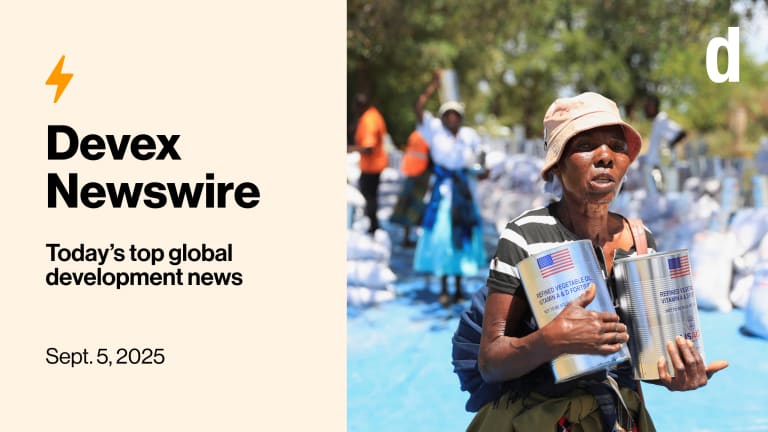
Some of the most prominent United States-based foundations share a problematic history. Several of their founders and early supporters had ties to the eugenics movement, a racist pseudoscience whose believers sought to “improve” humanity by manipulating human reproduction.
This is a preview of Newswire
Sign up to this newsletter for an inside look at the biggest stories in global development, in your inbox daily.
The Ford Foundation and Rockefeller Foundation are among the long list of U.S.-based philanthropies that helped fund the eugenics movement during the early 20th century, Stephanie Beasley reports.
“All of the great names of legacy philanthropy are implicated in this movement,” Ford Foundation President Darren Walker said during a virtual event hosted by the Anti-Eugenics Project last week.
Many foundation leaders are now trying to reckon with those harmful legacies.
The Rockefeller has launched an internal investigation to uncover more details about its involvement in the movement, according to the foundation’s president, Rajiv Shah. As they wrestle with uncomfortable truths about their past, foundations have an opportunity to think differently about the work they fund today, said John Palfrey, president at the John D. and Catherine T. MacArthur Foundation.
But the question of how to confront the past can also be a divisive one. Last week, we reported that two board members of Pathfinder International — a leading reproductive health NGO — resigned from their positions and withdrew financial support, citing disagreements about how to address founder Clarence Gamble’s ties to eugenics, among other issues.
Read: Top global foundations mount effort to confront legacies of eugenics
Falling through the cracks
“The Taliban do not see the difference between Afghan civilians who worked with us, and those who were directly employed by the British government, and nor should we.”
— Laure-Hélène Piron, former U.K. government officialWill Worley reports that Afghans who worked on U.K.-funded development projects are struggling to navigate a “needlessly complex” resettlement program, as one former aid worker describes how he is now in hiding after the Taliban seized his old employment records.
Read: ‘I will be killed’: Afghan aid workers left stranded by UK government
ICYMI: UK PM: Afghan resettlement program to include civil society actors
Who’s who
UN Women’s new executive director, Wellcome’s new head of policy for infectious diseases, and U.S. President Joe Biden’s nominee to lead the U.S. Export-Import Bank. Check out Catherine Cheney’s roundup of September’s biggest executive appointments in global development.
Devex Pro: Who's who in #globaldev: September 2021 executive appointments
+ A Devex Pro subscription offers deeper analysis of the development sector, exclusive access to digital events, and the opportunity to engage directly with our newsroom. Get access to these perks by signing up to our 15-day free trial.
Cost of doing business
The International Monetary Fund's executive board is scheduled to meet today to question lawyers with the firm that investigated the World Bank’s Doing Business report, according to Reuters. Among the questions they intend to probe are the scope of WilmerHale’s assignment, how the firm conducted its investigation, and how the decision was made to publish their report.
The meeting could play a pivotal role in determining whether the board will continue to support IMF Managing Director Kristalina Georgieva — who was implicated in allegations of data manipulation — or if she will find herself under even more pressure.
ICYMI: World Bank scraps Doing Business rankings due to data irregularities
Double standards
Former British Prime Minister Tony Blair, Jordan’s King Abdullah II, and Kenyan President Uhuru Kenyatta are among those whose secret offshore fortunes are detailed in a trove of leaked documents known as the Pandora Papers.
Blair, who has championed good governance — particularly in Africa — since leaving office, bought an offshore company to avoid £312,000 ($423,134) in taxes on his purchase of a London building. Kenyatta, who has said he wants transparency and fighting corruption to be his legacy, is linked — along with his family — to 13 offshore companies.
WASH needs a leader
Can UN-Water be the global leader the WASH space needs?
Pedro Arrojo-Agudo, the United Nations special rapporteur for the human right to water and sanitation believes so. UN-Water must be empowered to take more leadership when it comes to tackling the global water crisis, he tells Rebecca Root.
Currently, there is no leader of the WASH movement. UN-Water simply acts as an interagency mechanism, coordinating the various efforts of U.N. entities and other organizations, and there is no single entity dedicated to WASH within the U.N. system.
“UN-Water must lead directly, must develop a stronger … dialogue and links with, for instance, those most interested in achieving the Sustainable Development Goal 6,” says Arrojo-Agudo.
Devex Pro: UN special rapporteur for water on the need to empower UN-Water
In other news
The U.N. Palestinian refugee agency will request $800 million in annual funding at a donor conference in November and says it has a more than $100 million funding gap this year. [Al Jazeera]
In Bangladesh, Cox’s Bazar police have arrested five men in connection with the death of prominent Rohingya leader Mohib Ullah. [Times of India]
U.N. chief António Guterres has rejected the Ethiopian government’s decision to expel seven of its senior officials following claims of meddling in the African country's internal affairs. [Reuters]
The World Bank has greenlit $400 million for Nigeria to help the country purchase COVID-19 vaccines. [Axios]
Sign up to Newswire for an inside look at the biggest stories in global development.








